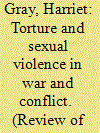| Srl | Item |
| 1 |
ID:
165901


|
|
|
|
|
| Summary/Abstract |
It is well established in the literature that migration has become increasingly securitized. In this article, we examine the racialized and gendered grids of intelligibility that make securitizing moves possible in the migration context. Specifically, we argue that the securitization of migration during the so-called EU refugee crisis comes into being through intertwined and mutually dependent representations of racialized, masculinized threat and racialized, feminized vulnerability, which are woven into the scaffolding of colonial modernity. We construct our argument through an analysis of relevant newspaper articles published in British newspapers between September 2015 and March 2016. Accordingly, our discussion advances understandings of the dominant narratives through which the ‘refugee crisis’ has been understood. In addition, in highlighting the naturalized inequalities that underpin securitizing speech acts, the article also contributes to literature that seeks to add an improved understanding of power to securitization theory.
|
|
|
|
|
|
|
|
|
|
|
|
|
|
|
|
| 2 |
ID:
171918


|
|
|
|
|
| Summary/Abstract |
Despite the wide repository of knowledge about conflict-related sexual violence that now exists, there remains a lack of understanding about how victims/survivors of such violence themselves make sense of and frame their experiences in conversation with global and local discourses and with the categorisations that underpin support programmes. Such sense-making is important not only because the ways in which violence is categorised shape a victim/survivor's ability to access particular forms of recognition and support, but also because it is central in how shattered selves and worlds are remade in the aftermath of violence. Drawing on individual and group interviews conducted with refugees living in Kampala, Uganda, this article charts how framings of ‘torture’ and ‘sexual violence’ become meaningful in participants’ accounts in the (re)formation of themselves as subjects after violent victimisation. We trace how participants navigate the heteronormative societal and legal norms that shape their subjectivity and the effects of the violence they experienced through the deeply gendered and political work that these terms do in their narratives. Our analysis thus highlights and reminds us to pay attention to the political stakes involved in fluid processes of categorising injury.
|
|
|
|
|
|
|
|
|
|
|
|
|
|
|
|